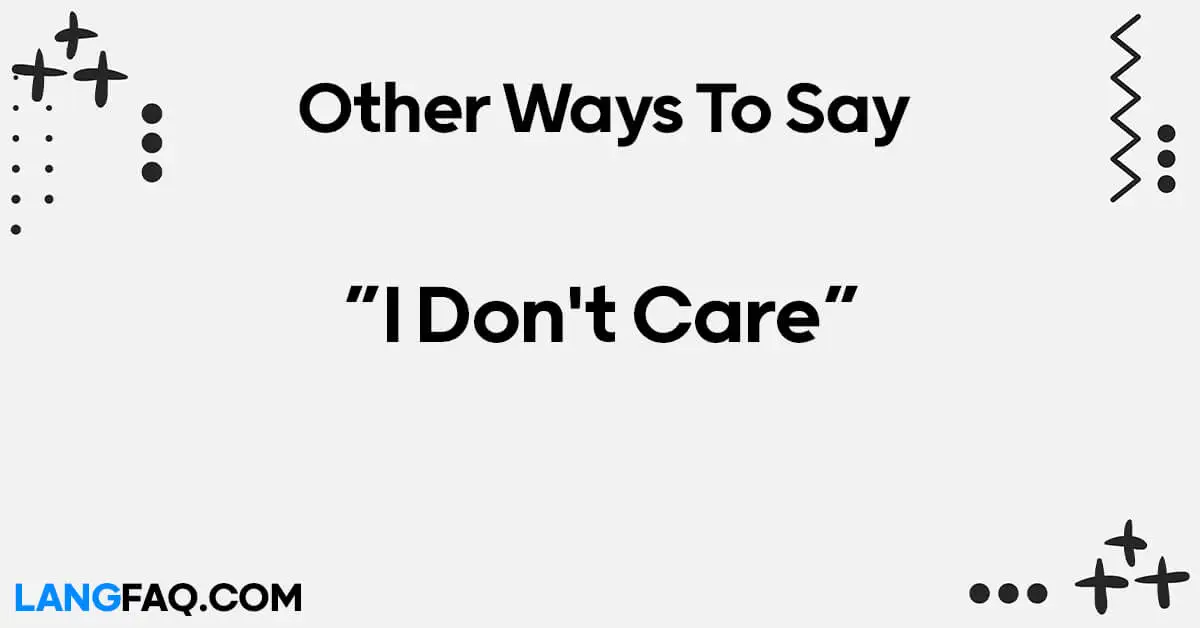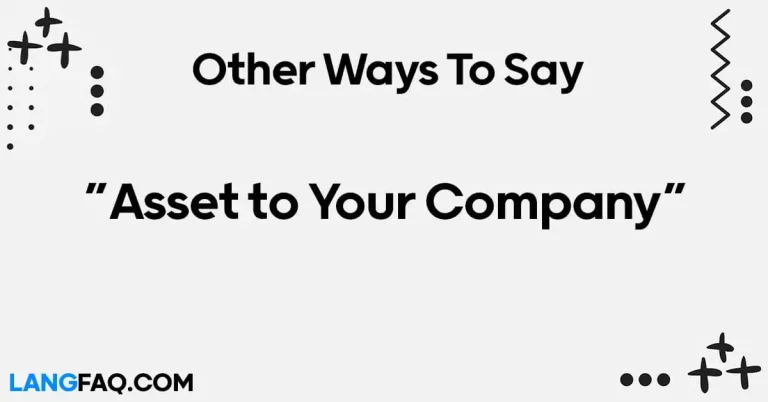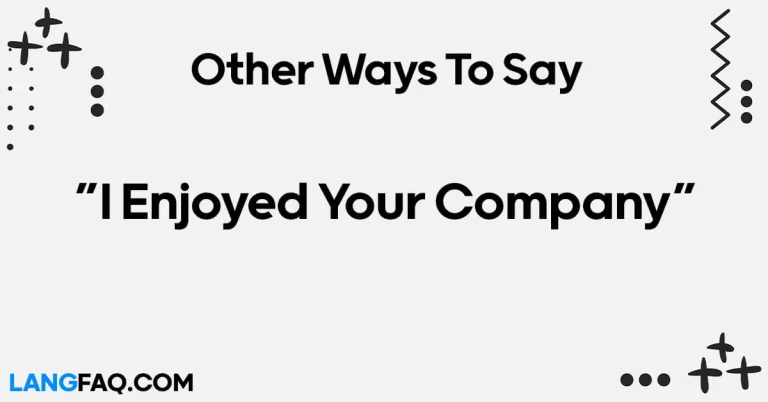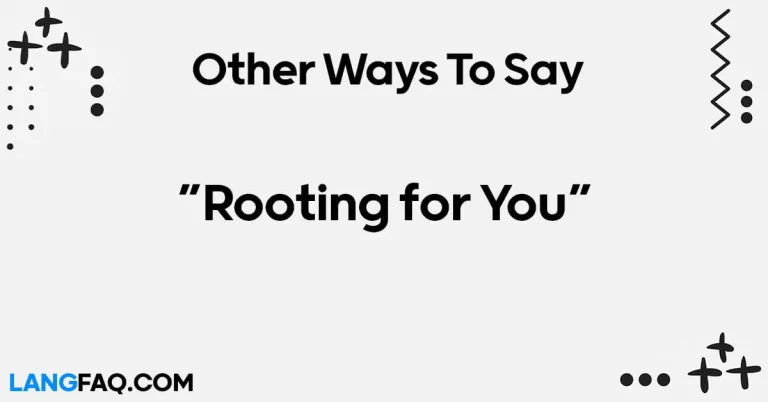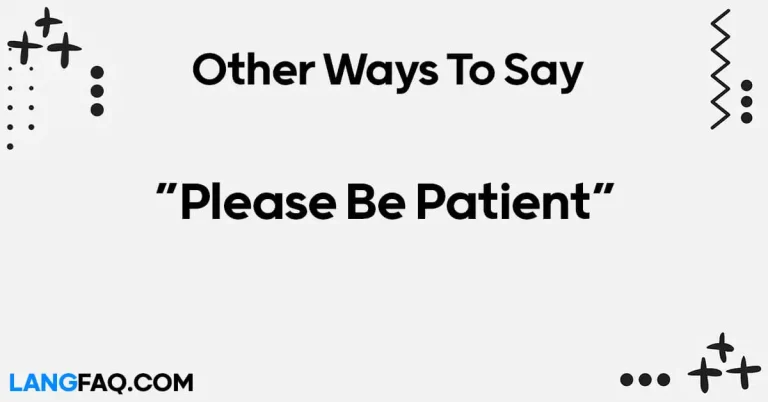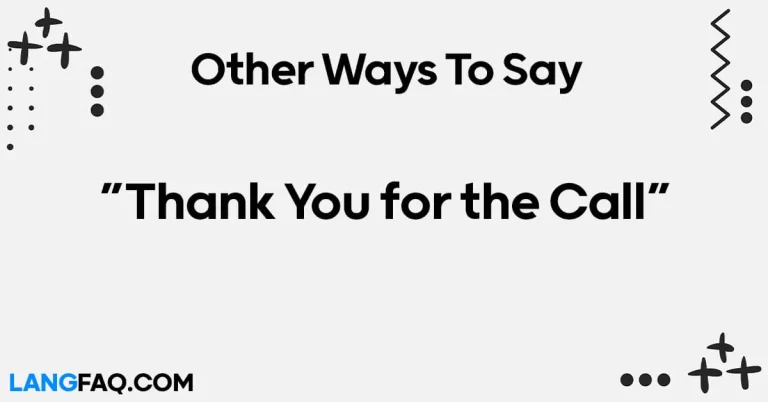Welcome to a linguistic journey where we delve into the art of expressing indifference. In this article, we will explore 12 unique alternatives to the commonly used phrase “I Don’t Care.” Whether you’re looking for a casual remark or a more formal response, this comprehensive guide has you covered. Let’s infuse a touch of creativity into your conversations!
12 Other Ways to Say “I Don’t Care”
Here are 12 other ways to express “I don’t care” in English:
- I’m indifferent.
- It makes no difference to me.
- I have no strong feelings either way.
- Whatever floats your boat.
- I remain neutral.
- It’s of no consequence to me.
- Couldn’t be bothered.
- I’m easy.
- Makes no difference to me.
- I’m apathetic.
- I’m not fussed.
- Take it or leave it.
Here’s a table with meanings and examples for the 12 ways to say “I don’t care”:
| Expression | Meaning | Example |
|---|---|---|
| I’m indifferent | Lack of interest or concern | “I’m indifferent to the outcome of the game.” |
| It makes no difference to me | No impact or significance | “Your choice or mine, it makes no difference to me.” |
| I have no strong feelings either way | Neutral stance | “I have no strong feelings either way about the proposal.” |
| Whatever floats your boat | Indifference with a touch of informality | “Choose any movie you like, whatever floats your boat.” |
| I remain neutral | Maintaining a neutral or unbiased position | “As a mediator, I must remain neutral in the dispute.” |
| It’s of no consequence to me | Lack of importance or significance | “Whether we go or not is of no consequence to me.” |
| Couldn’t be bothered | Unwillingness to make an effort or care | “I couldn’t be bothered to attend the meeting.” |
| I’m easy | Easygoing attitude | “Feel free to decide; I’m easy.” |
| Makes no difference to me | Emphasizing the lack of impact or preference | “Staying in or going out makes no difference to me.” |
| I’m apathetic | Lack of interest or enthusiasm | “His constant complaints leave me apathetic.” |
| I’m not fussed | Not concerned or bothered | “The color of the curtains? I’m not fussed.” |
| Take it or leave it | Offering something with indifference | “This is the deal – take it or leave it.” |
In the vast landscape of language, expressing indifference can be nuanced and varied. These alternatives to “I don’t care” provide a spectrum of choices, from the formal “I remain neutral” to the casual “Whatever floats your boat.” Tailoring your response based on the situation and your level of familiarity with the audience adds richness to your communication.
Is It Correct to Say “I Don’t Care”?
Certainly! “I don’t care” is a commonly used phrase to express indifference or a lack of preference. However, its appropriateness depends on the context and the tone in which it is used.
When it’s Appropriate:
- Casual Conversations:
- Example: Friend: “Which movie should we watch?” You: “I don’t care; surprise me!”
- Expressing Indifference:
- Example: Co-worker: “Where should we have lunch?” You: “I don’t care; I’m open to suggestions.”
- Situations of Genuine Indifference:
- Example: Parent: “Do you want tea or coffee?” You: “I don’t care; either is fine.”
When it May Not Be Appropriate:
- Formal or Professional Settings:
- Using “I don’t care” in a formal meeting or professional discussion might come across as too casual. It’s advisable to opt for more diplomatic expressions like “I’m neutral” or “I have no strong preference.”
- Example: Manager: “Which project should we prioritize?” You: “I’m neutral; let’s consider the pros and cons.”
- Sensitive or Emotional Topics:
- In situations where the topic is sensitive or emotional, saying “I don’t care” might be perceived as dismissive. It’s crucial to be mindful of the impact of your words.
- Example: Friend sharing personal struggles: “Do you have any thoughts on my situation?” You: “I care about you, and I’m here to support you.”
- Decision-Making Scenarios:
- In cases where a decision needs to be made, responding with “I don’t care” might not contribute positively. It’s better to engage in the decision-making process constructively.
- Example: Team Leader: “What approach should we take for this project?” You: “I think we should consider both options and weigh the pros and cons.”
Verdict:
“I don’t care” is generally acceptable in informal and low-stakes situations, where a casual attitude is appropriate. However, in more formal or emotionally charged scenarios, choosing alternative expressions that convey your stance more diplomatically or empathetically would be advisable.
Professional Mail Example With “”
Subject: Clarification on Project Prioritization
Dear [Recipient’s Name],
I hope this email finds you well. I wanted to seek some clarification regarding the upcoming project prioritization meeting.
In the recent discussions, there have been various proposals regarding the order of project prioritization. As for my stance, I would like to express that I remain neutral on this matter. I believe both projects have their merits, and I am open to further discussions to weigh the pros and cons of each.
If there are specific considerations or additional information that I need to take into account, please do let me know. I want to ensure that our decision-making process is thorough and comprehensive.
I appreciate your understanding and am looking forward to a productive discussion during the meeting.
Best regards,
[Your Full Name] [Your Position] [Your Contact Information]
1. I’m Indifferent
Indifference can be a powerful stance, suggesting a lack of emotional investment. In formal contexts, such as business meetings or professional discussions, “I’m indifferent” communicates a balanced and objective viewpoint. However, in personal relationships, it may come off as aloof.
Example: Business Scenario: Colleague: “Which project should we prioritize first?” You: “I’m indifferent; I believe both have merits. Let’s weigh the pros and cons.”
Personal Scenario: Friend: “Where do you want to go for dinner?” You: “I’m indifferent, honestly. Pick a place you like, and I’m good with it.”
Variations:
- In professional settings: “I maintain a neutral stance on the matter.”
- Among friends: “I don’t have a strong preference; you decide.”
Email Sample:
Subject: Project Prioritization Meeting
Dear Team,
In our upcoming meeting, I’d like to express my indifference regarding the order of project prioritization. I believe both projects have their strengths, and I’m open to the team’s insights.
Best regards, [Your Name]
2. It Makes No Difference to Me
This phrase emphasizes a lack of impact or significance, suitable for situations where the choice holds equal weight. In both formal and informal contexts, it conveys adaptability and an easygoing attitude.
Example: Professional Setting: Manager: “Which software platform do you prefer?” You: “Honestly, it makes no difference to me; I can adapt to either.”
Casual Setting: Friend: “Coffee or tea?” You: “Either is fine; it makes no difference to me.”
Variations:
- In a team setting: “I’m flexible; it makes no difference to me.”
- Among family: “I love both options; it makes no difference to me.”
Email Sample:
Subject: Flexible Schedule Proposal
Dear Team,
Regarding the proposed schedule changes, I’d like to express that it makes no difference to me. I’m adaptable and can work with any adjustments.
Best, [Your Name]
3. I Have No Strong Feelings Either Way
This phrase combines politeness with a clear lack of preference. It’s suitable for formal and diplomatic contexts where maintaining a balanced tone is crucial.
Example: Formal Setting: Board Member: “Should we proceed with Plan A or B?” You: “I have no strong feelings either way; both plans seem viable.”
Family Discussion: Parent: “Which movie should we watch tonight?” You: “I have no strong feelings either way; I’m open to suggestions.”
Variations:
- In negotiations: “I have no strong feelings on either proposal.”
- Among friends: “I have no strong feelings either way; surprise me!”
Email Sample:
Subject: Proposal Evaluation
Dear [Recipient],
After careful consideration, I have no strong feelings either way regarding the proposed changes. I look forward to our discussion.
Best regards, [Your Name]
4. Whatever Floats Your Boat
This idiom injects a touch of informality and friendliness into the conversation. It’s versatile and can be used in various settings, from casual talks with friends to more relaxed professional environments.
Example: Casual Setting: Friend: “Pizza or burgers?” You: “Whatever floats your boat; I’m good with either.”
Team Decision-Making: Colleague: “Which design do you prefer?” You: “Whatever floats your boat; both options look great.”
Variations:
- Among friends: “Whatever works for you is fine with me.”
- In project discussions: “Choose the approach that floats your boat.”
Email Sample:
Subject: Design Feedback
Hi [Recipient],
I’ve reviewed the design options, and I’m flexible. Whatever floats your boat works for me.
Cheers, [Your Name]
5. I Remain Neutral
In formal and professional contexts, remaining neutral can be a diplomatic way to express indifference. It suggests impartiality and a commitment to fair judgment.
Example: Workplace Scenario: Supervisor: “How do you feel about the proposed changes?” You: “I remain neutral, awaiting more information and analysis.”
Team Decision-Making: Team Lead: “Which vendor should we choose?” You: “I remain neutral for now; let’s gather more data.”
Variations:
- In a debate: “I choose to remain neutral on this matter.”
- Among peers: “Remaining neutral allows me to make objective decisions.”
Email Sample:
Subject: Position on New Policies
Dear [Recipient],
Regarding the new policies, I currently remain neutral. I look forward to further discussions.
Sincerely, [Your Name]
6. It’s of No Consequence to Me
This more formal expression conveys a sense of detachment and suggests that the matter holds no particular significance or importance to you.
Example: Corporate Setting: Executive: “Your opinion on the conference date?” You: “It’s of no consequence to me; I’ll adjust my schedule accordingly.”
Family Decision: Sibling: “Which restaurant do you prefer?” You: “Honestly, it’s of no consequence to me; I trust your choice.”
Variations:
- In negotiations: “The terms are of no consequence to me; I’m focused on the outcome.”
- Among friends: “Whether we go out or stay in is of no consequence to me.”
Email Sample:
Subject: Schedule Adjustment
Dear [Recipient],
The proposed schedule changes are of no consequence to me. I trust we can find a suitable solution.
Best regards, [Your Name]
7. Couldn’t Be Bothered
This phrase encapsulates a certain level of disinterest or unwillingness to invest effort. It can be used informally, particularly among friends or in situations where a more laid-back tone is acceptable.
Example: Everyday Conversation: Friend: “Are you joining the gym with us?” You: “Couldn’t be bothered, honestly. I prefer outdoor activities.”
Team Project: Colleague: “Do you want to lead the presentation?” You: “Couldn’t be bothered this time; I’ll support in other ways.”
Variations:
- Among close friends: “I couldn’t be bothered; let’s keep it low-key this weekend.”
- In a group project: “Couldn’t be bothered with the intricate details this round.”
Email Sample:
Subject: Participation in Task Force
Hi [Recipient],
Regarding the task force participation, I couldn’t be bothered at this moment. Let me know if there are alternative ways to contribute.
Cheers, [Your Name]
8. I’m Easy
This colloquial expression maintains simplicity while indicating an easygoing and flexible attitude. It’s versatile and can be applied in both professional and casual settings.
Example: Office Discussion: Manager: “Do you mind taking on this additional task?” You: “I’m easy; I can manage it without any issue.”
Social Gathering: Friend: “Which movie should we watch?” You: “I’m easy; anything entertaining works for me.”
Variations:
- In work collaboration: “I’m easy to work with, flexible with ideas.”
- Among family members: “I’m easy when it comes to weekend plans.”
Email Sample:
Subject: Task Assignment
Dear [Recipient],
Concerning the task assignment, I’m easy and ready to take it on. Let me know the specifics.
Best, [Your Name]
9. Makes No Difference to Me
This straightforward expression underlines the insignificance of the choice presented. It suits various scenarios, conveying a lack of preference without any added complexity.
Example: Team Decision: Leader: “Which software tool do you prefer?” You: “Honestly, it makes no difference to me; both are efficient.”
Casual Discussion: Friend: “Tea or coffee?” You: “Makes no difference to me; I enjoy both equally.”
Variations:
- In project discussions: “The color scheme makes no difference to me; I trust your judgment.”
- Among peers: “Attending the morning or afternoon session makes no difference to me.”
Email Sample:
Subject: Project Preferences
Hi [Recipient],
In considering project preferences, I want to emphasize that it makes no difference to me. Let’s proceed with what works for the team.
Regards, [Your Name]
10. I’m Apathetic
Apathy implies a lack of interest or enthusiasm, and using this term can convey a more profound sense of disinterest. It’s suitable for situations where you want to emphasize your lack of emotional involvement.
Example: Group Decision: Team Member: “Any thoughts on the team outing?” You: “I’m apathetic, honestly. I don’t have a strong preference.”
Personal Choice: Friend: “Which book should we read for the book club?” You: “I’m quite apathetic about the selection; surprise me.”
Variations:
- In a work context: “I’m apathetic towards the proposed changes; it doesn’t impact my role significantly.”
- Among friends: “I’m feeling a bit apathetic about the weekend plans; let’s keep it simple.”
Email Sample:
Subject: Team Outing Suggestions
Dear [Recipient],
Concerning the team outing suggestions, I’m feeling quite apathetic about the choices. I’m open to whatever the majority prefers.
Best, [Your Name]
11. I’m Not Fussed
This informal phrase suggests a laid-back attitude, often used when expressing a lack of preference without any strong opinions. It’s suitable for various contexts, from casual conversations to workplace discussions.
Example: Project Decision: Colleague: “Which approach do you think is best?” You: “I’m not fussed; both methods seem effective.”
Weekend Plans: Friend: “Dinner at home or dining out?” You: “I’m not fussed; whatever suits the group works for me.”
Variations:
- In project collaborations: “I’m not fussed about the project timeline; I trust your judgment.”
- Among family members: “Choosing a movie? I’m not fussed; surprise me.”
Email Sample:
Subject: Input on Project Timeline
Dear [Recipient],
In providing my input on the project timeline, I’m not fussed about the specifics. I trust the team’s decision.
Regards, [Your Name]
12. Take It or Leave It
This assertive expression implies presenting something with indifference and leaves the decision entirely to the other party. It’s suitable for situations where you want to communicate your terms clearly.
Example: Negotiation Scenario: Client: “Can you provide a discount?” You: “The current pricing stands; take it or leave it.”
Project Contribution: Team Member: “Can you take on additional responsibilities?” You: “My current workload is set; take it or leave it.”
Variations:
- In discussions with peers: “The proposal is as is; take it or leave it.”
- Among friends: “My suggestion for the weekend plans is straightforward; take it or leave it.”
Email Sample:
Subject: Proposal Confirmation
Dear [Recipient],
The proposal remains unchanged; take it or leave it. Looking forward to your response.
Best, [Your Name]
FAQs
What’s the Most Casual Way to Say “I Don’t Care”?
In casual settings, phrases like “Whatever floats your boat” or “I’m easy” convey a laid-back attitude without sounding dismissive.
Are Formal Expressions Necessary in Everyday Conversations?
While not always required, using formal expressions like “I remain neutral” or “It’s of no consequence to me” can enhance your communication in professional or formal settings.
How Can I Politely Express Indifference?
To express indifference politely, phrases such as “I have no strong feelings either way” or a simple “I’m indifferent” strike a balance between assertiveness and respect.
Can I Use Nonchalant Remarks in Professional Settings?
While it depends on the context, nonchalant remarks like “Couldn’t be bothered” may be better suited for casual environments. In professional settings, opt for more formal expressions.
Should I Always Provide Alternatives When Expressing Indifference?
Not necessarily. While offering alternatives can be considerate, it’s not mandatory. Clearly stating your lack of preference without additional suggestions is perfectly acceptable.
How Can I Convey Indifference in a Diplomatic Manner?
To convey indifference diplomatically, phrases like “I remain neutral” or “It’s of no consequence to me” can help maintain a diplomatic tone.
Conclusion:
Mastering the art of expressing indifference opens doors to effective communication. Whether you opt for a nonchalant remark, casual response, formal expression, or a polite disinterest, the key lies in conveying your message with clarity and tact. Expand your linguistic repertoire and navigate conversations with confidence.

